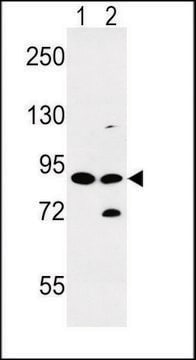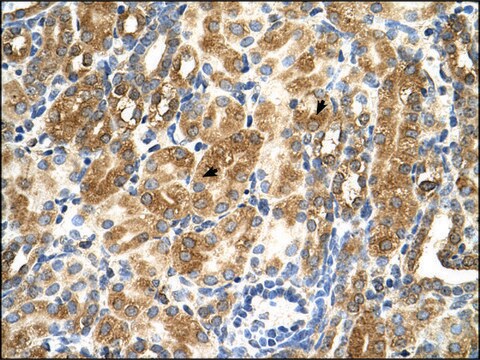おすすめの製品
由来生物
mouse
品質水準
抗体製品の状態
purified antibody
抗体製品タイプ
primary antibodies
クローン
TwMab-1, monoclonal
分子量
calculated mol wt 127 kDa
observed mol wt ~127 kDa
精製方法
using protein G
化学種の反応性
human
包装
antibody small pack of 100
テクニック
western blot: suitable
アイソタイプ
IgG1κ
エピトープ配列
N-terminal half
タンパク質IDアクセッション番号
UniProtアクセッション番号
保管温度
2-8°C
特異性
Clone TwMab-1 is a mouse monoclonal antibody that detects Telomerase reverse transcriptase (TERT). It targets an epitope within 11 amino acids from the N-terminal half.
免疫原
KLH-conjugated linear peptide corresponding to 11 amino acids from the N-terminal half of human Telomerase reverse transcriptase (TERT).
アプリケーション
Quality Control Testing
Isotype testing: Identity confirmation by Isotyping Test.
Isotyping Analysis: The identity of this monoclonal antibody is confirmed by isotyping test to be mouse IgG1k.
Tested Applications
Western Blotting Analysis: A 1:100 dilution from a representative lot detected TERT in lysate from HEK293T cells with ectopic expression of hTERT (positive), but not in lysate from wild-type HEK293T cells (negative). ( Data courtesy of Dr. Kenkichi Masutomi, National Cancer Center Research Institute, Tokyo, Japan).
Note: Actual optimal working dilutions must be determined by end user as specimens, and experimental conditions may vary with the end user.
Isotype testing: Identity confirmation by Isotyping Test.
Isotyping Analysis: The identity of this monoclonal antibody is confirmed by isotyping test to be mouse IgG1k.
Tested Applications
Western Blotting Analysis: A 1:100 dilution from a representative lot detected TERT in lysate from HEK293T cells with ectopic expression of hTERT (positive), but not in lysate from wild-type HEK293T cells (negative). ( Data courtesy of Dr. Kenkichi Masutomi, National Cancer Center Research Institute, Tokyo, Japan).
Note: Actual optimal working dilutions must be determined by end user as specimens, and experimental conditions may vary with the end user.
ターゲットの説明
Telomerase reverse transcriptase (UniProt: O14746; also known as EC:2.7.7.49, HEST2, Telomerase catalytic subunit, Telomerase-associated protein 2, TP2) is encoded by the TERT (also known as EST2, TCS1, TRT) gene (Gene ID: 7015) in human. Telomerase is a ribonucleoprotein enzyme essential for the replication of chromosome termini in most eukaryotes. Telomerase reverse transcriptase (TERT) is the catalytic subunit of the telomerase responsible for adding TTAGGG repeats to the chromosome telomere ends. The catalytic cycle involves primer binding, primer extension and release of product once the template boundary has been reached or nascent product translocation followed by further extension. Cells with low or no telomerase expression lose telomere repeats during cell division, eventually resulting in cellular senescence. Most cancer cells, germ cells, and embryonic stem cells express high levels of telomerase, thus contributing to pluripotency and immortality. In addition to its telomere maintenance function, telomerase also has a pro-survival role in cellular resistance against DNA damage and ensuing apoptosis. Most cancer cells are highly proliferative and express high levels of nuclear telomerase activity. TERT is reported to shuttle between nuclear and cytoplasm and this shuttling is depended upon cell cycle, phosphorylation state, transformation, and DNA damage. TERT is also detected in the mitochondria where it helps prevent nuclear DNA damage by decreasing mitochondrial reactive oxygen species (ROS). Following exposure to H2O2 or -irradiation, cancer cells capable of excluding TERT from the nucleus display little or no DNA damage, while TERT nuclear retainment results in high DNA damage. Phosphorylation at tyrosine 707 under oxidative stress leads to translocation of TERT to the cytoplasm and reduces its anti-apoptotic activity and its dephosphorylation by SHP2/PTPN11 leads to its nuclear retention. Phosphorylation at serine 227 by AKT is reported to promote nuclear location. Phosphorylation of TERT at threonine 249 is reported to be a novel tumor biomarker of aggressive cancer with poor prognosis. (Ref.: Masuda, Y., et al. (2022). J. Pathol. 257(2); 172-185; Jacob, S., et al. (2008). J. Biol. Chem. 283(48); 33155-33161; Haendeler, J., et al. (2004). Circ. Res. 94(6); 768-775).
物理的形状
Purified mouse monoclonal antibody IgG1 in buffer containing 0.1 M Tris-Glycine (pH 7.4), 150 mM NaCl with 0.05% sodium azide.
再構成
0.5 mg/mL. Please refer to guidance on suggested starting dilutions and/or titers per application and sample type.
保管および安定性
Stable for 1 year at +2°C to +8°C from date of receipt.
その他情報
Concentration: Please refer to the Certificate of Analysis for the lot-specific concentration.
免責事項
Unless otherwise stated in our catalog or other company documentation accompanying the product(s), our products are intended for research use only and are not to be used for any other purpose, which includes but is not limited to, unauthorized commercial uses, in vitro diagnostic uses, ex vivo or in vivo therapeutic uses or any type of consumption or application to humans or animals.
Not finding the right product?
Try our 製品選択ツール.
保管分類コード
12 - Non Combustible Liquids
WGK
WGK 1
引火点(°F)
Not applicable
引火点(℃)
Not applicable
適用法令
試験研究用途を考慮した関連法令を主に挙げております。化学物質以外については、一部の情報のみ提供しています。 製品を安全かつ合法的に使用することは、使用者の義務です。最新情報により修正される場合があります。WEBの反映には時間を要することがあるため、適宜SDSをご参照ください。
Jan Code
MABE1995-25UG:
MABE1995-100UG:
試験成績書(COA)
製品のロット番号・バッチ番号を入力して、試験成績書(COA) を検索できます。ロット番号・バッチ番号は、製品ラベルに「Lot」または「Batch」に続いて記載されています。
ライフサイエンス、有機合成、材料科学、クロマトグラフィー、分析など、あらゆる分野の研究に経験のあるメンバーがおります。.
製品に関するお問い合わせはこちら(テクニカルサービス)








